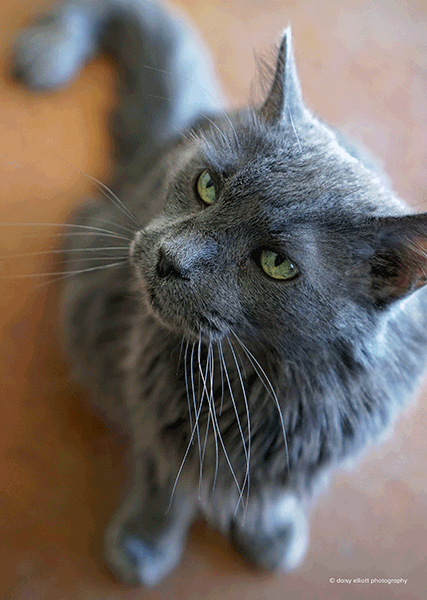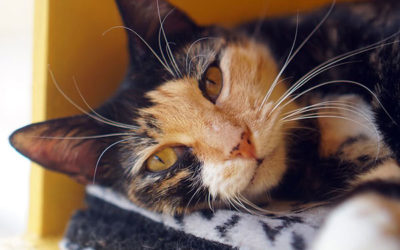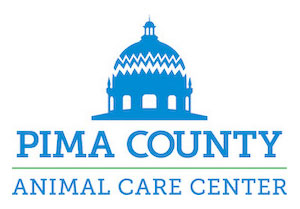Story By Kelli Van Nuys Photo Courtesy of The Hermitage
“Many of the people who rescue these cats are diabetics themselves, because they understand what it’s like and they know all of their care needs,” Karen
Baden, Executive Director of the Hermitage Cat Shelter, said. “They know that diabetes is not a death sentence, and that they deserve a life too.”
How much would you give to care for your cat? Could you prick her ear for blood twice a day, or give injections to save his life? Pima Animal Care Center (PACC) has made great strides over the last 5 years to improve shelter conditions and policies. PACC’s successes are a move toward a no-kill philosophy, providing life and rehabilitation to 90% of dogs and cats that enter their doors. Every animal that sets food in the shelter now has a better chance at a second life. However, it can be more difficult to attain when they have a life-threatening condition. Diabetic cats, like Rolly, a 16-year-old diabetic owner-surrender, are given a week to find safe placement.
There is no hiding the care needs of diabetic cats – they need ear and paw pricks to take blood glucose, twice-daily insulin injections to regulate blood sugar, and a special diet to limit carbohydrates and increase protein. Without special attention, their health can degrade quickly and lead to more severe conditions. An animal shelter is no place for a diabetic cat to thrive. PACC does the best they can for every cat, but with hundreds needing food, water, medicine, and love, they cannot keep up with the special needs of a diabetic. PACC relies on rescue partners to help find adopters and fosters for these special needs cats, so the cats can get the attention they require.
In September 2017, it was clear that Rolly was sick. He nibbled on his food infrequently, with limp coat and weak back legs, while lying in his PACC kennel. The story was the same for Puss’N’Boots, a sweet 13-year-old girl rescued from euthanasia, and Caticu, a loving Russian Blue who got his name at Hermitage Cat Shelter. Every one of these cats never gave up hope for a new life.
With daily care needs, diabetic cats are costly. Insulin can be over $100 per month, and there are insulin needles and tools to prick the cat’s ear. Special in-home glucose test kits are necessary for long-term diabetics and cost at least $40. Diabetic cats must be on a special diet, which sometimes requires prescription Science Diet Diabetic Management (DM). These needs, along with frequent vet visits, mean a diabetic cat can cost more than $1,000 per year.
But is it really that bad? The short answer is: no.
Rolly received generous dona-tions, called pledges, from the community to save his life. Pledges covered the cost of his initial vet visit and a cat glucose-monitoring system. As long as there was can food in front of him, Rolly did not fight his ear pricks or insulin injections. After 3 months of Diabetic Management (DM) food, he switched to other low-carbohydrate canned foods. He gained weight quickly; after six months in his new home, he was a healthy, happy cat.
The Hermitage Cat Shelter offers a solution for those worried about the costs: the life-saving option called The Lease-for-Life program. The program allows interested families to “adopt” a special needs cat, paying minimal costs for the cat’s medical needs.
The Hermitage has a special Diabetic and Weight Management room, where Caticu and Puss’N’Boots spend their days. They have an indoor space with plenty of cat trees, cubbies, beds, and hiding spots, as well as a private “catio” to safely go outside and feel the fresh air. Though Caticu and ‘Boots both have these amazing accommodations, Hermitage’s Director, Karen Baden, emphasizes they still need their own home. “Even the cats doing good here do so much better in a home,” she said. “They thrive with the individual attention and love.”
Diabetic cats are a bless-ing. A special bond of love and trust is built when their new family nurses them back to health; in many cases, they support their people by fighting medical troubles alongside them. A child with diabetes can look at their diabetic cat and understand the importance of the insulin shots and doctor visits. Everyday, the rescue family will watch their cat battle a chronic illness, while living her life with no worry in the world. Any family struggling with medical or mental illness may benefit from having a cat to look after and care for; they will receive unconditional love in return.
Please consider saving a diabetic cat from PACC, or reaching out to local rescues like The Hermitage Cat Shelter to foster, adopt, or donate.
The Hermitage Cat Shelter & Sanctuary
5278 E. 21st St., Tucson, AZ 85711
(520) 571-7839
hermitagecatshelter.org













